Charles Negy, associate professor of psychology, is set to be fired unless he can convince UCF or a judge to reverse the university’s decision.
Knight News obtained the letter Negy sent to UCF in response to his proposed termination on Tuesday, in which he said UCF has gone to great lengths over the last seven months to try and find legitimate grounds for his termination.
In the letter, Negy said UCF’s investigation and proposed termination sends a powerful message to anyone at UCF who holds unpopular or unorthodox views.
“… speak your mind, and the university will devote all of is resources, for as long as it takes, to justify destroying your career,” Negy said. “I urge you to please consider whether this is truly the path that UCF, as an institution that is bound by the First Amendment and that purports to be committed to the free exchange of ideas, wishes to take.”
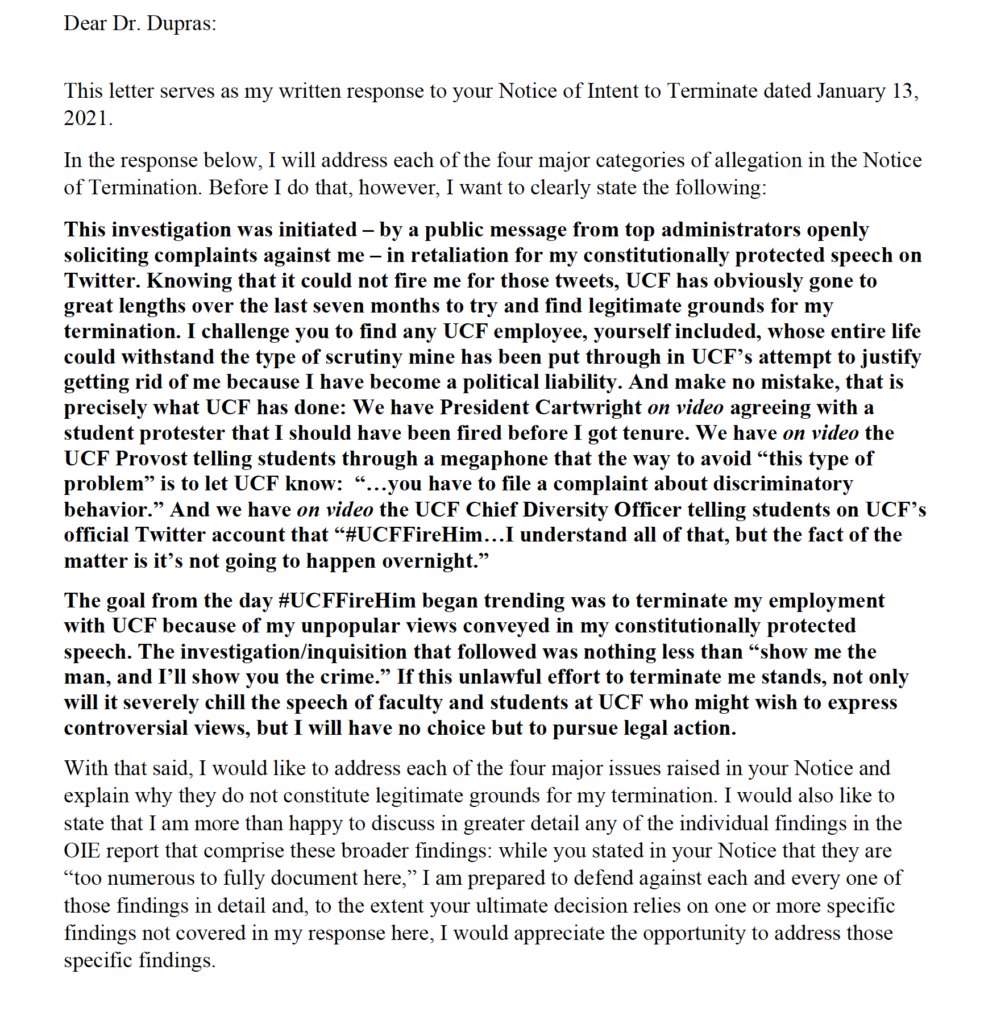
“If this unlawful effort to terminate me stands, not only will it severely chill the speech of faculty and students at UCF who might wish to express controversial views, but I will have no choice but to pursue legal action,” Negy said.
Last week, Knight News reported the university’s findings following months of investigation into the professor.
Tosha Dupras, interim dean of the College of Sciences, said in the Jan. 13 letter sent to Negy the university will make a final decision on his termination after any timely written response from him is reviewed.
Knight News obtained the OIE Investigation Report and Notice of Intent to Terminate on Jan. 13. The full report and the letter sent to Negy can be read on the next few pages.
Dupras said the Office of Institutional Equity completed a report on its investigation and listed the following findings leading to his proposed termination.
- Negy provided false information during OIE’s investigation, according to Dupras’ letter sent to Negy on Jan. 13.
- Negy created a hostile learning environment for students through discriminatory harassment.
- Dupras also said Negy’s conduct in the classroom violated UCF’s Employee Code of Conduct.
- Negy deterred students from filing complaints about his classroom conduct.
- Negy failed to report that a student disclosed that she had been sexually assaulted by one of your teaching assistants in February 2014.
Dupras said the findings by OIE are not related to Negy’s Twitter postings, as OIE found they were protected by his First Amendment rights. Knight News previously covered this topic in June.
“The university respects your right to exercise academic freedom in making those comments, although that does not mean that your views on such matters and those of the university are the same,” Dupras said in the Jan. 13 letter.
She said some of the complaints about Negy’s comments to students about sensitive or controversial matters were found to be permissible based on academic freedom.
“Details about each of these findings are too numerous to fully document here,” Dupras wrote in the Jan. 13 letter. “They may be found in OIE’s investigative report.”
In his response to the proposed termination, Negy said he is prepared to defend and further elaborate on the findings.
“I am prepared to defend against each and every one of those findings in detail and, to the extent your ultimate decision relies on one or more specific findings not covered in my response here, I would appreciate the opportunity to address those specific findings,” Negy said.
Negy’s response to UCF’s findings that state he provided false information during OIE’s investigation.
Negy said it is stunning that UCF would make this finding based on his failure to perfectly recollect things said over the span of 15 years.
He said he begged UCF, in writing, for notice of the allegations against him so that he could adequately prepare for the investigative interviews.
“I have all of my efforts to learn more about the allegations — and all of Nancy Myers’ denials of those requests — in writing, and I believe this constitutes an egregious violation of my constitutional due process rights,” he said in the letter obtained by Knight News.
Negy said UCF violated his due process rights by denying him adequate notice and then used his unpreparedness to “attack his integrity” and make findings of untruthfulness.
“If anything reveals the utter bad faith of this investigation, it is this. I am 60 years of age. I do not recall every single comment I’ve made in my classes over the 2005-2020 period encompassed by UCF’s investigation,” Negy said. “To the extent I forgot things that were captured on recording – recordings that UCF could have provided me with, to refresh my memory and ask me about the incidents in question — this was because I was unable to prepare adequately for my investigative interview due to UCF’s lack of notice, not because I was trying to deliberately mislead the investigator.”
Negy said that OIE used this finding of “supposed untruthfulness” to judge him less credible in many of the instances in which he denied allegations.
“In other words, the entire outcome of UCF’s investigation turned on a credibility assessment that was made based on my inability to prepare for my investigative interview due to an unconstitutional lack of notice,” he said.
Negy’s response to UCF’s findings that he created a hostile learning environment for students through discriminatory harassment, and that his conduct in the classroom violated UCF’s Employee Code of Conduct.
Negy said the investigation confirmed that he is a controversial instructor “who has ruffled more than a few feathers over the years” but said none of OIE’s findings against him rise to the level of hostile environment harassment.
In his response letter to the proposed termination, Negy defined parts of UCF’s policy.
“… hostile environment harassment is conduct ‘so severe or pervasive that it unreasonably interferes with, limits, deprives, or alters the terms or conditions of education … when viewed from both a subjective and objective perspective,'” he said.
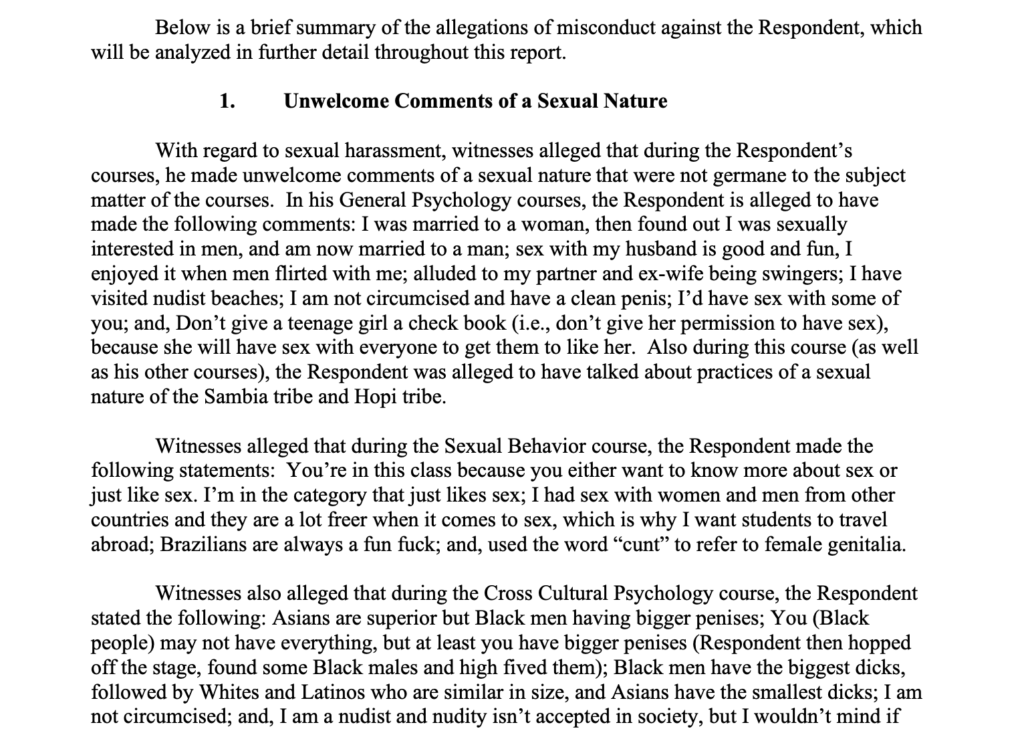
The full report can be read on the next pages.
Negy said this is a narrowly drawn definition because speech cannot be prohibited simply because someone finds it offensive.
“A handful of constitutionally protected but arguably provocative comments, cherry-picked from over the course of 15 years spent teaching tens of thousands of students, do not even remotely rise to this level,” he said.
Negy said a number of the comments cited by OIE as alleged evidence of a hostile environment were — contrary to OIE’s analysis — clearly protected by academic freedom.
“… for example, my comment in a psychology lecture that some women are attracted/seek marriage to individuals with money,” Negy said. “Or my comment in cross-cultural psychology that human-animal sex happens all over the world.”
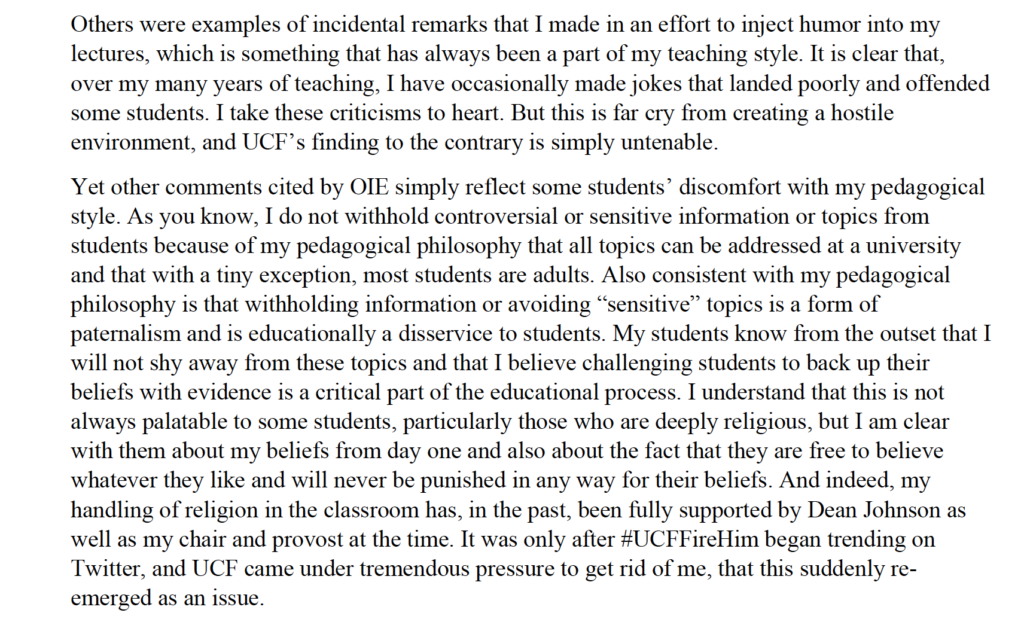
“As for the one exam item that was cited in the OIE report as evidence that I penalized religious students for their beliefs, I take issue with the way that was characterized,” he said in the letter.
Negy said the exam item does not mention any specific religion and does not even mention the word ‘religion’.
“I was trying to to get my students to consider how an idea that seems entirely ordinary in our culture — the idea that we are being watched and judged 24/7 on our thoughts and actions and will be punished for any transgressions — would be viewed through the lens of someone to whom that was an unfamiliar concept,” he said.
Negy said part of his goal as an educator is to get students to see and consider things from other perspectives but said that this is a “far cry from being subjected to an unlawful hostile environment” in the classroom.
“I do acknowledge that the question’s wording does not fully capture the aims I described above, and I wish that I had phrased it differently,” he said. “But again, I submit that no one’s 20+ year career has been devoid of mistakes, and an inartfully phrased exam question is cause for conversation, not termination.”
In response to the claim that he violated the UCF Employee Code of Conduct for his conduct in the classroom, Negy said it is “simply unconstitutional.”
“… the language of that policy under which you are attempting to punish me is simply unconstitutional. A public university like UCF bound as it is by the First Amendment, cannot punish people for speech that someone subjectively deems “disrespectful” or insufficiently celebratory of diversity or inclusion,” he said.
Negy said policies like this have been struck down on First Amendment grounds at colleges around the country and said he does not believe UCF’s policy would survive a constitutional challenge.
Negy’s response to UCF’s findings that he deterred students from filing complaints about his classroom conduct.
“This is a gross mischaracterization of a brief discussion I have – typically on the first day of class – about the purpose of a university, the importance of free speech, and the concept of tenure,” Negy said in the letter. “That ‘orientation’ lasts perhaps 5 minutes at most.”
Negy said if the topic of tenure or free speech were to come up at any other point during the semester, it would be incidental and likely directly relevant to something brought up by a student.
“It rarely is addressed other than on the first day of class,” he said. “And my right to discuss the importance of free speech in the classroom — and the importance of tenure to professors’ right to free speech — is wholly protected by the First Amendment and by academic freedom.”
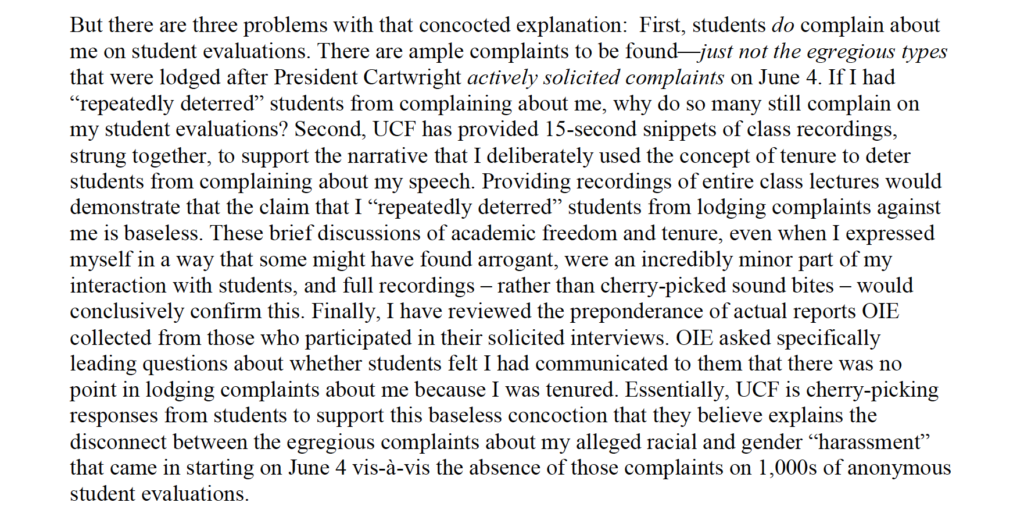
“The effort to transform this protected expression into some kind of impermissible attempt to suppress student complaints is both preposterous and unconstitutional,” Negy said.
Negy’s response to UCF’s findings that he failed to report that a student disclosed that she had been sexually assaulted by one of his teaching assistants in February 2014.
Negy said in his letter sent to the university on Tuesday that this is “simply not accurate.”
“I am going to tell you exactly what I was informed of by my students back in 2014, and I assure you that if the information I received then was something I was required to report, then I had not been properly trained on this by the university,” he said.
In 2014, Negy said two female students entered his office and told him they didn’t feel comfortable being in close proximity to his volunteer undergraduate teacher-assistant. Negy said he was informed of this just before the two students were about to have an exam in his class.
“I asked what had happened, and they told me they were at a gathering (a party, I believe) and that my T.A. went and sat right next to them and made them feel very uncomfortable,” Negy said. “Naturally, I inquired about what he had said or done to upset them. They both told me that he was speaking to them in a way as if he wanted them to be interested in him romantically.”
Negy said he asked if the teaching assistant touched them inappropriately and the two female students denied it.
“I proceeded to tell them that they could seek help — perhaps counseling — on campus if they were distressed about that experience and that at my end, what I could do … “
Negy said he had the teaching assistant monitor the class from the back of the room and had the female students sit close to the front to where he teaches. He said he asked the students again if they had been touched and they denied it.
Negy said this incident was known to multiple parties at the time and that beyond that initial phone call, no one from UCF ever raised the issue of my failing to report the alleged sexual assault until recently.
“The university raised this with me at the time, and — when I explained what I had been told and that I was not aware that I was expected to report it — the issue was dropped and never raised again until now, strongly suggesting that this is yet another pretextual effort to get rid of me for expressing views the university finds repugnant,” Negy said.
Negy said in the letter that no UCF office ever re-contacted him about his obligation to have reported the situation, his chair never mentioned the situation to him, and no mention of his mishandling of this situation was reported in his annual review for that year.
Negy said that in 2014 when the incident occurred, the university had never provided training or mandated him to obtain training about his reporting obligations of an incident similar to this.
“If I was indeed obligated to report what my students told me — that my T.A. sat down next to them at a party and spoke to them in a way that made them uncomfortable — then the university failed to appropriately train me in this,” Negy said.
Negy’s response to UCF’s findings of bribery of a health care worker in Peru based on the content of his textbook.
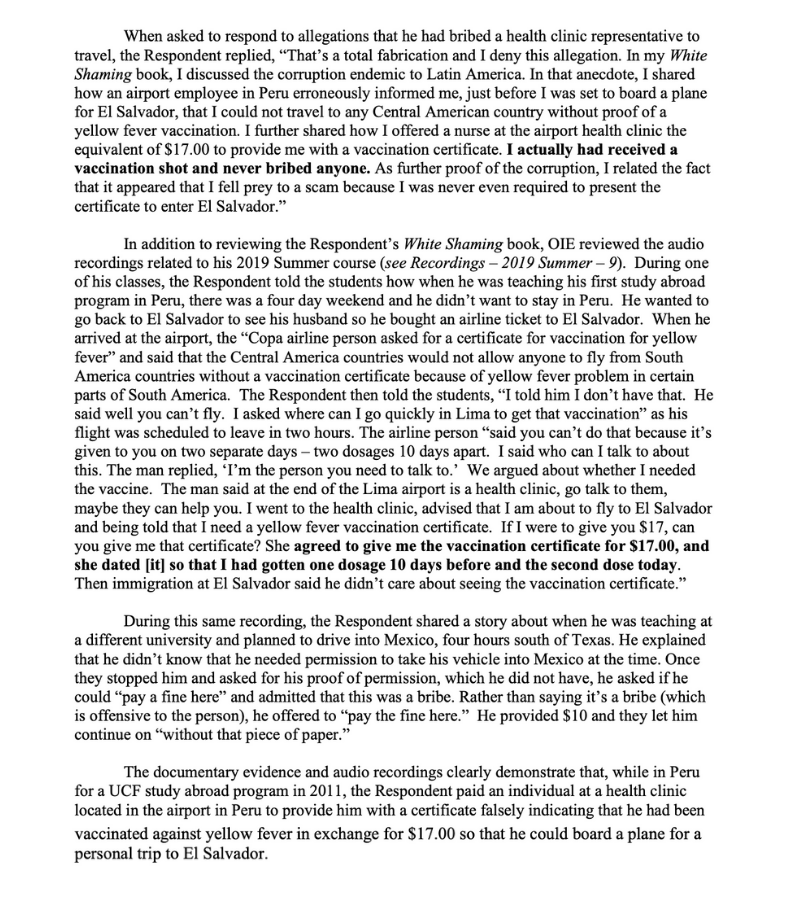
“What is reported in my book, White Shaming, is a 9-year-old anecdotal recollection of an experience that I framed in a particular way to make a point about the pervasiveness of corruption in Latin America,” Negy said.
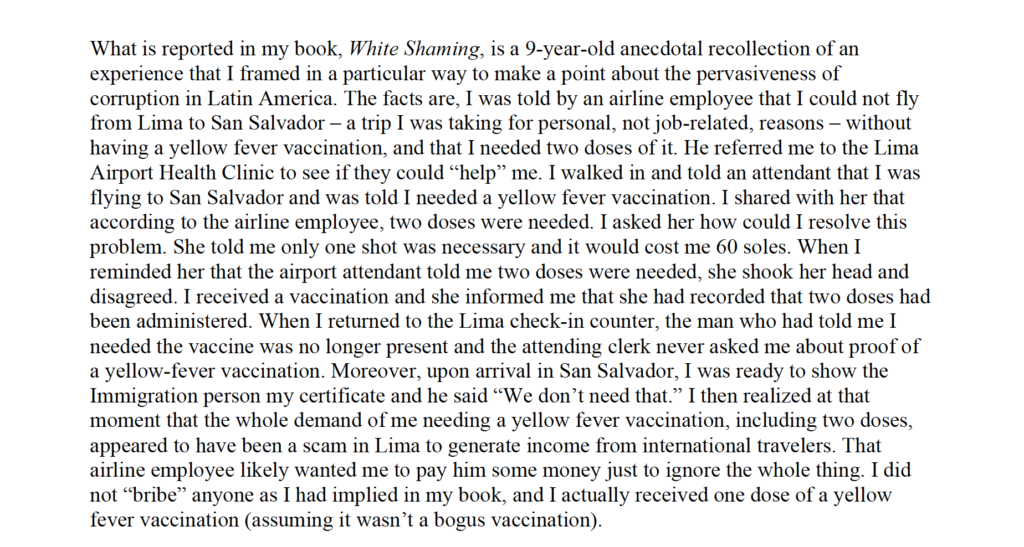
The full letter can be read on the next page.
“The fact that, years later, UCF would use this anecdote in an effort to terminate me for allegedly violating university policy demonstrates that — far from being a good-faith investigation into alleged discrimination and harassment — this was a wide-ranging fishing expedition designed to find any conceivable pretext to justify firing me,” Negy said.
In his letter, Negy said the “Anti-corruption and Bribery” policy the university has in place now did not exist at the time of the incident.
“So instead, OIE cites regulations in force at the time that bear absolutely no relationship to the conduct alleged – regulations on the ‘pursuit and communication of scientific and scholarly knowledge’ – to transform that conduct into something punishable,” he said.
“Thank you for this opportunity to express my positions on these charges,” Negy wrote to conclude his response letter. “If you have questions that you’d like to ask me directly about any of these matters, please communicate with me or my primary attorney.”
Dupras said the university will make a final decision regarding Negy’s termination after any timely written response from him is reviewed.
In the Jan. 13 letter, Dupras said Negy will receive a letter from the university communicating that decision as soon as practicable.
Click to the next page to see the records obtained by Knight News and previous coverage on the topic.
This is a developing story and will be updated with new information.
Check back with Knight News for updates.





